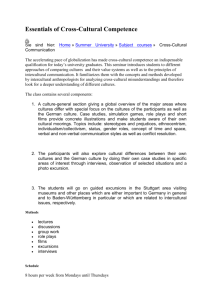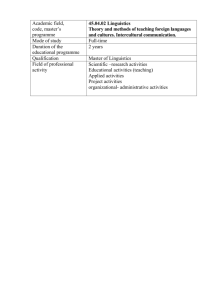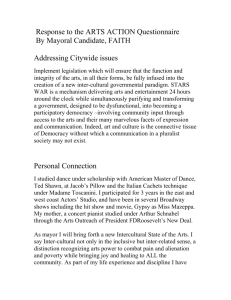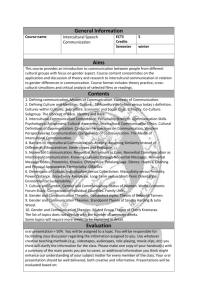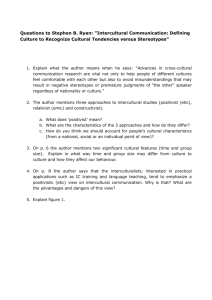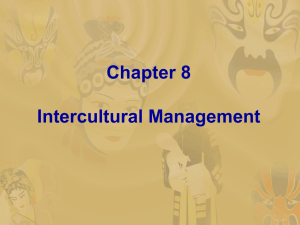TO:
advertisement
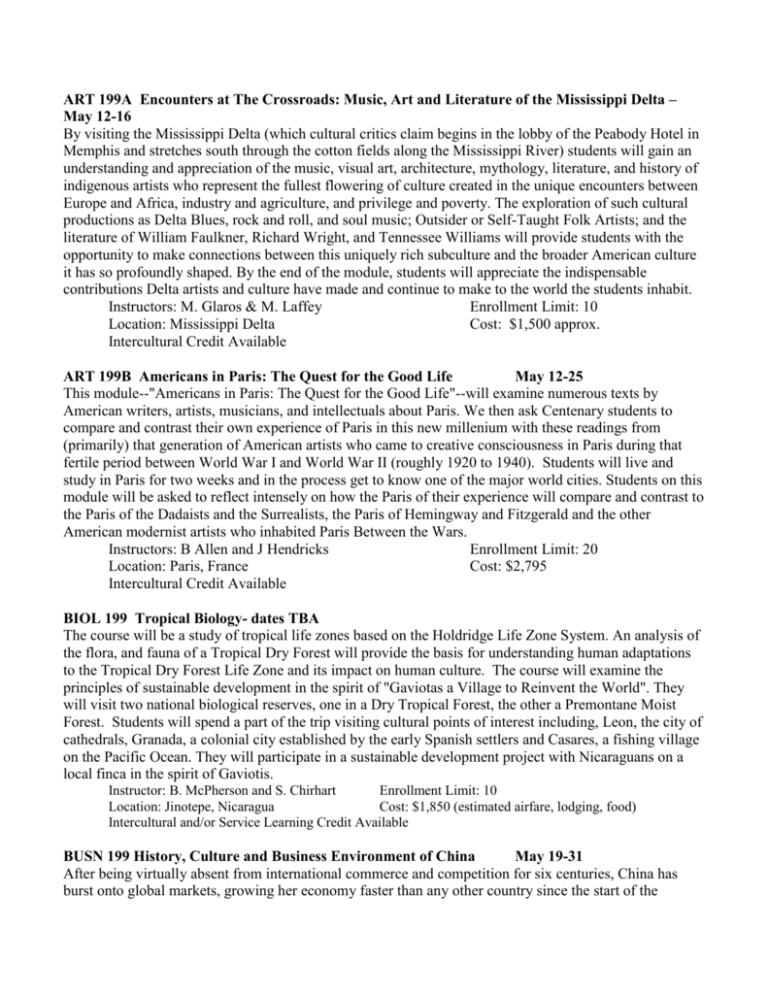
ART 199A Encounters at The Crossroads: Music, Art and Literature of the Mississippi Delta – May 12-16 By visiting the Mississippi Delta (which cultural critics claim begins in the lobby of the Peabody Hotel in Memphis and stretches south through the cotton fields along the Mississippi River) students will gain an understanding and appreciation of the music, visual art, architecture, mythology, literature, and history of indigenous artists who represent the fullest flowering of culture created in the unique encounters between Europe and Africa, industry and agriculture, and privilege and poverty. The exploration of such cultural productions as Delta Blues, rock and roll, and soul music; Outsider or Self-Taught Folk Artists; and the literature of William Faulkner, Richard Wright, and Tennessee Williams will provide students with the opportunity to make connections between this uniquely rich subculture and the broader American culture it has so profoundly shaped. By the end of the module, students will appreciate the indispensable contributions Delta artists and culture have made and continue to make to the world the students inhabit. Instructors: M. Glaros & M. Laffey Enrollment Limit: 10 Location: Mississippi Delta Cost: $1,500 approx. Intercultural Credit Available ART 199B Americans in Paris: The Quest for the Good Life May 12-25 This module--"Americans in Paris: The Quest for the Good Life"--will examine numerous texts by American writers, artists, musicians, and intellectuals about Paris. We then ask Centenary students to compare and contrast their own experience of Paris in this new millenium with these readings from (primarily) that generation of American artists who came to creative consciousness in Paris during that fertile period between World War I and World War II (roughly 1920 to 1940). Students will live and study in Paris for two weeks and in the process get to know one of the major world cities. Students on this module will be asked to reflect intensely on how the Paris of their experience will compare and contrast to the Paris of the Dadaists and the Surrealists, the Paris of Hemingway and Fitzgerald and the other American modernist artists who inhabited Paris Between the Wars. Instructors: B Allen and J Hendricks Enrollment Limit: 20 Location: Paris, France Cost: $2,795 Intercultural Credit Available BIOL 199 Tropical Biology- dates TBA The course will be a study of tropical life zones based on the Holdridge Life Zone System. An analysis of the flora, and fauna of a Tropical Dry Forest will provide the basis for understanding human adaptations to the Tropical Dry Forest Life Zone and its impact on human culture. The course will examine the principles of sustainable development in the spirit of "Gaviotas a Village to Reinvent the World". They will visit two national biological reserves, one in a Dry Tropical Forest, the other a Premontane Moist Forest. Students will spend a part of the trip visiting cultural points of interest including, Leon, the city of cathedrals, Granada, a colonial city established by the early Spanish settlers and Casares, a fishing village on the Pacific Ocean. They will participate in a sustainable development project with Nicaraguans on a local finca in the spirit of Gaviotis. Instructor: B. McPherson and S. Chirhart Enrollment Limit: 10 Location: Jinotepe, Nicaragua Cost: $1,850 (estimated airfare, lodging, food) Intercultural and/or Service Learning Credit Available BUSN 199 History, Culture and Business Environment of China May 19-31 After being virtually absent from international commerce and competition for six centuries, China has burst onto global markets, growing her economy faster than any other country since the start of the industrial revolution. Participants in this module travel to Beijing, Xi’an, Shanghai, Shenxhen, and Hong Kong to explore China’s history, Culture and current business environment. Key differences between Chinese and Western social and business cultures will be examined. Instructors: C Martin and G Nolte Enrollment Limit: 20 Location: 2 days in Shreveport, Beijing, Shanghai, Hong Kong Cost: $3,145 Intercultural Credit Available EDUC 199A Urban Education Setting May 12-21 The purpose of this course is to provide students both an academic and social perspective on how today’s teachers and students respond in urban educational settings. This course will satisfy the requirements as set forth in the Centenary Plan for Service Learning or Inter-cultural credit. Students will work with a variety of students, including low-income minority students, for approximately 48 hours during the module. Instructor: Julia Thorn Enrollment Limit: 30 Location: Stoner Hill, Broadmoor Middle School, Byrd High School Intercultural and/or Service Learning Credit Available EDUC 199B The Xia Dynasty to the 2008 Olympics May 12-28 Once in China, students will be meet Chinese in a variety of contexts: exploring the capital along with Chinese tourists at the Forbidden City (Beijing) and The Great Wall (Simitai); traveling by train on an overnight sleeper (an experience sometimes described as the most egalitarian interaction permitted a foreigner with the casual camaraderie afforded tight quarters and extended time); viewing the Terra Cotta Warriors and Bronze Chariots (Xian) in the center of the nation—once the capital and start of the silk road and now the most Muslim part of the nation; cruising down the Li River and watching the sunrise on top of Huangshan (Yellow Mountain) in more rural and mountainous villages; strolling through the canals of the “Venice of the Orient” (Suzhou) while haggling with local merchants; and experiencing a cosmopolitan city (Shanghai) and its overrepresented images of west meets east. From beginning to end of the trip students not only will interact daily with official hosts, Chinese citizens, international tourists, and fellow course participants, but will be challenged through oral and written assessments to process these experiences. Throughout the experience, instructors will help students to see connections between objectives, interactions, activities, texts, and assessments to demonstrate understanding of how learning objectives are met through educational designs. The final course project will focus on applying the basics of educational program planning in order to evaluate this year’s multidisciplinary “Chinese Culture 101” and propose a modified course for next year. Instructors: R Prickett and M Webber Enrollment Limit: 17 Location: Beijing, Smiitai, Xian, Shanghai Cost: $4,625 Intercultural Credit Available FLNG 199 Germany's North and East May 16-June 10 "Germany's North and East": The 2008 module in Germany (Bremen and Dresden) offers students the opportunity to interact with people from different cultures, study world-famous works of art and stunning architecture from various centuries. In both cities, students will meet Germans on a daily basis. Furthermore, special events are planned which include students and other young people living in Germany. Follow-up discussions will allow for deeper intercultural reflections. Instructors: M. Gruettner and J. Hamming. Enrollment Limit: 20 Location: Bremen & Dresden Costs: $2,450 Intercultural Credit Available GEOL 199 The Pele Experience: The Geology, Biology, and Cultures of the Hawaiian IslandsExact Dates: TBA The Pele Experience is a study of the living geology, biology and unique cultures of the Hawaiian Islands. The course will look at the various peoples of Hawaii, examine how their disparate cultures eventually merge into a single, identifiable modern Hawaiian culture, and how this culture was molded by the unique volcanic formation of the islands. The module will also examine the relationships between the geology and the people in relationship to the flora and fauna of the islands. The module will begin with two days (twelve class hours) of intensive classroom study at Centenary College. The module will then explore the Hawaiian Islands for ten days, emphasizing the three components listed above. Instructors: S. Vetter, E. Leuck, R. Bukoff Enrollment Limit: 20 Location: Hawaiian Islands Costs: between $2,500.00/$3,000.00 Intercultural Credit Available PSC 199A Gay Politics May 12-30 An examination of gays and lesbians as a political movement in American Politics from a legal perspective. Topics include history of the movement, sexuality and identity, government regulation of gay and lesbians, religion and sexuality, public opinion, pressure group activity, and public policies relating to employment, parenting, AIDS, and domestic partnerships. Objectives include stimulating interest in a growing subfield or political science, developing student skills, and promoting tolerance. Instructor: Rodney Grunes Enrollment Limit: 20 Location: on campus and local community Cost: none Intercultural Credit Available PSC 199B Cultural Identity in Modern and Historic Spain May 15-30 We will examine competing notions of identity and culture in modern and historic Spain by considering art, architecture, political history, religion (Christianity, Islam, and Judaism), national and regional identity, and other facets of culture like dance, bullfighting, and daily life in Spain, as seen by insiders and outsiders. Before departure, we will read accounts of travels through Spain and we will read and watch depictions of Spanish life and culture (especially cultural clashes) by Spanish filmmakers and contemporary women writers. Once in Spain, we will visit internationally renowned museums like the Prado, tour architectural marvels like the Alhambra, view memorials to the Spanish Civil War like Picasso’s Guernica and the Valley of the Fallen, attend cultural events like a flamenco show in the Roma quarter of Granada and an optional bullfight, visit historic synagogues, mosques, and cathedrals, and make a day trip to Morocco to explore the interconnections between Spain and North Africa. Throughout the trip, students will participate in conversations with residents and other tourists, consider competing notions of Spanish identity (European/Spanish/regional; Christian/Islamic/Jewish; minority groups [Roma, N. African]), and consider the students’ own identities, culture, and history. Instructors: K VanHoosier-Carey & P Barker Enrollment Limit: 16 Location: Madrid, Seville, and Granada, Spain Cost: $3,000 Intercultural Credit Available REL 199 Religions of Northern India May 11-June 8 Students will explore the major religious traditions of Northern India, with special attention granted to the traditions and teachings of Tibetan Buddhism. Objectives: 1. To study Hinduism, Buddhism, Sikhism, Jainism and Islam in the socio-cultural context of Northern India 2. To study Tibetan Buddhism under several high lamas (Rinpoches) 3. To visit the major temples and shrines of these religious traditions, including the Taj Mahal 4. To establish an email relationship with a Tibetan nun or monk two months prior to departure and spend significant face-to-face time with their email partner while in Dharamsala, India* 5. To provide students an optional opportunity to fulfill their Service Learning requirement while in Dharamsala. Instructors: D Otto, N Guidry Enrollment Limit: 20 Location: Northern India Cost: $3,040 (plus additional meals, misc. exp.) Intercultural Credit and Service Learning Credit (optional) Available SOC 199 Intersections of Environments and Cultures in Ecuador April 25-June 13 Students will explore the different cultures and ecological environments of Ecuador and examine how they influence each other. Students will spend time in at least seven distinctively different ecological environments: high altitude glacier, high altitude grassland, forested mountains, both arid and verdant mid-altitude environments, lower altitude cloud forests, and mid-altitude rainforest. Students will visit a range of cultural sites, including: Pre-Columbian archeological ruins; villages of different Indian cultures; sites of 17th century colonial architecture (both the "old city" itself, and particular buildings); locally renown museums; and (optionally) a bullfight, a smaller scale practice event, and/or a cockfight. Students will also experience a range of distinctly different ecological environments in ways that facilitate their appreciation of those environments, and not simply driving through them. They will have opportunities to travel through the mountains on! horseback, or mountain bike; through the Amazon in kayak, canoe, or white raft, or up a glacier with pitons and ice-axe, all with professional guides. Finally, there is also a component of the module that addresses the most recent and fast developing intersections of culture and environment: international volunteers working towards sustainable development. Before returning to Shreveport, students will join other students and volunteers from around the world in working with a nonprofit organization aimed at holistically serving communities in developing countries. By the end of the module students should have better understandings of the cultures they've come into contact with, of their own cultures, and how any culture can intersect with the natural environment around it. Instructors: L Demerath & J Demerath Enrollment Limit: 12 Location: Ecuador Cost: $2,100 Intercultural Credit Available

